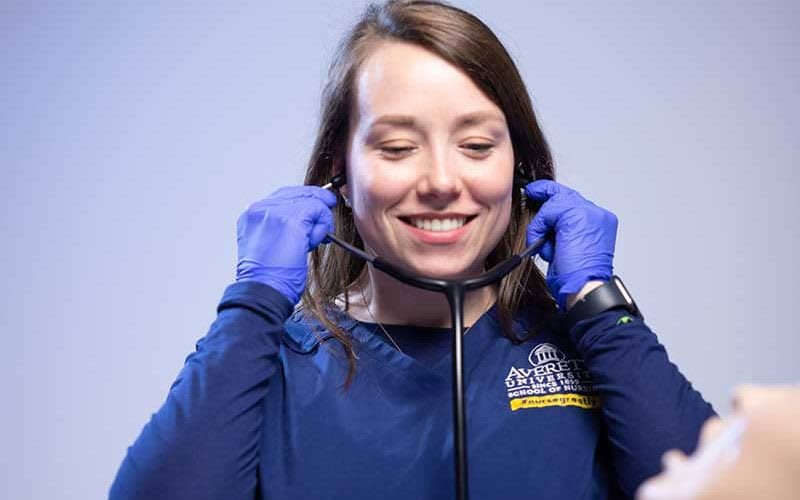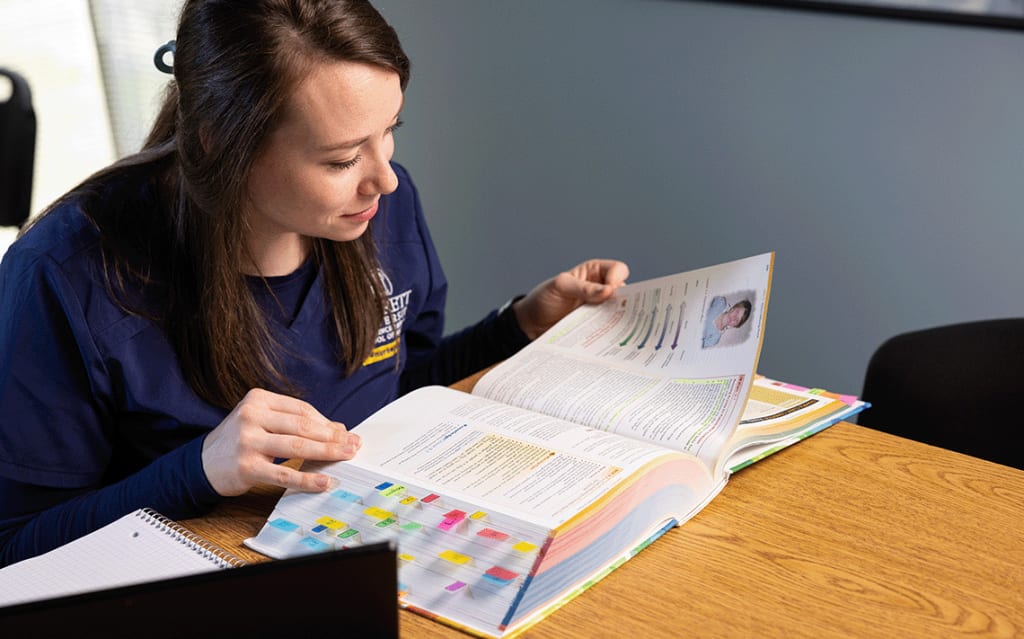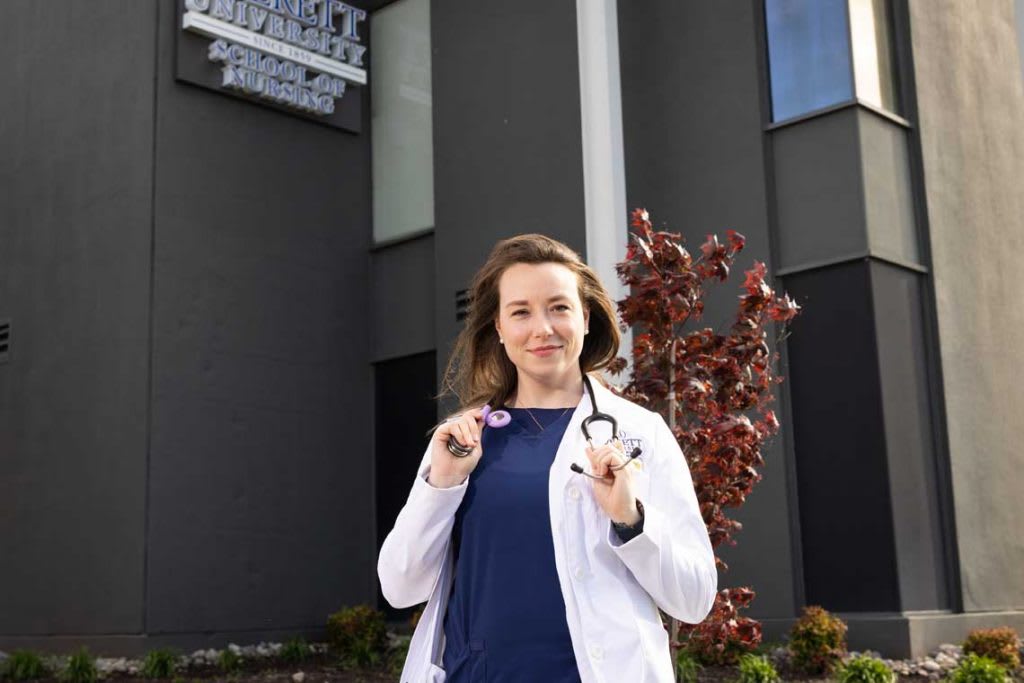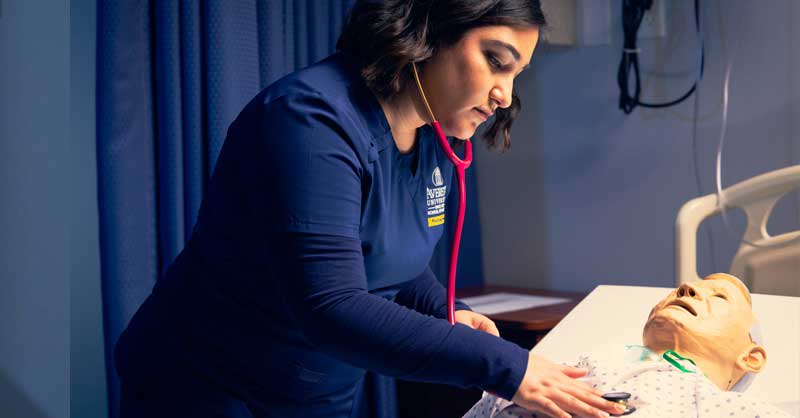How to Become a Nurse Practitioner
Each blog post is dated and contains accurate information as of that date. Certain information may have changed since the blog post publication date. If you would like to confirm the current accuracy of blog information, please visit our ABSN overview page or contact admissions at (866) 483-8705.
If you are exploring options for a nursing career, becoming a nurse practitioner has many benefits. Answer your questions like “What is a nurse practitioner?” and “How to become a nurse practitioner?” by reading these five steps and how Averett’s ABSN program can accelerate the process.

When choosing a career path to pursue in nursing, you will find some obvious advantages to becoming a nurse practitioner (NP). But what does it take to become an NP, and what does that journey look like for someone just starting out in nursing?
At Averett University, we want to encourage you and make your dreams attainable in a short amount of time. With the help of our Accelerated Bachelor of Science in Nursing (ABSN) program, you can finish nursing school in as few as 16 months and start pursuing your dream of becoming an NP.
What Is a Nurse Practitioner?
Nurse practitioners share some similarities with registered nurses but also have many differences. Both roles are vital to a functioning medical facility, but NPs have a wider range of responsibilities and scope of practice. Additionally, the median pay for NPs in 2021 was $123,780 – significantly higher than that for RNs.
Since NPs are required to pursue a higher level of education than RNs, and certification criteria are more stringent, they can practice with more autonomy and are better compensated. In addition to completing your Bachelor of Science in Nursing (BSN), you must earn a master’s degree and pass a national certification exam.
What Do Nurse Practitioners Do?

As a nurse practitioner, you have boundless options and opportunities. You can choose which specialty you would like to pursue. Because NPs are required to achieve a higher level of education, they can also perform duties other nurses cannot. Some of these include:
- Diagnosing patients
- Writing prescriptions
- Ordering lab tests
NPs typically take leadership positions within the workplace. They have a broader knowledge base, so other nurses look to them for insight. If leadership is one of your strengths, consider pursuing education beyond a BSN.
Nurse Practitioners’ Education Requirements
The traditional education path to becoming an NP typically takes six years, but this can differ. A traditional BSN program will take four years, but if you choose Averett’s ABSN program, you can minimize your time in school and focus on pursuing an MSN program sooner. The master’s program you choose will likely span two years and prepare you to enter the workforce as a highly knowledgeable nurse practitioner. You will not be able to apply for licensure if you have not completed this level of education.
1. Earn Your BSN
You have big dreams of becoming a nurse, but you must start somewhere. You first need to earn a BSN to enter the world of nursing. During your bachelor's program, you will gain a fundamental knowledge base and begin applying it in a clinical setting. If you have previous college credits or a non-nursing degree, consider the Accelerated Bachelor of Science in Nursing (ABSN) program at Averett University. As an ABSN student, you can receive a degree from a fully accredited BSN program in as few as 16 months.

2. Gain Experience as an RN
While it might be tempting to jump straight into a master’s program immediately after finishing your bachelor’s, it is a good idea to work as a nurse for at least a couple of years before going back to school. What you learn in your MSN program will build on your experiences in the nursing field and help you be more reputable when you apply for nursing jobs after finishing grad school.
It is a good idea to gain experience in the field to discover what specialty you might like to pursue or which MSN program you would like to enroll in. Perhaps you are passionate about leading other nurses, teaching the next generation of nurses or working in labor and delivery. This will help you decide in what direction you want to go.

Are you curious about your specialty options as an RN? Check out these 7 nursing specialties in demand.
3. Earn Your MSN
Once you have gained experience and decided where your passion is leading you, it is time to enroll in an MSN program. These typically take two years and involve clinical hours, but this should be achievable as you already have spent time working as a nurse. You can choose which specialty most interests you and begin researching the requirements for certification in those areas. Some common options are leadership, pediatrics, nurse midwife, and nurse educator. Once you have completed your MSN, you are now eligible to enter a Doctor of Nursing Practice (DNP) program if you so choose.
4. Update Your Licensure
Upon graduating from your MSN program, you will need to pursue a certification program before you can officially become a licensed nurse practitioner. The type of license you choose will depend on your specialty. Some common choices for NP certification are the American Nurses Credentialing Center (ANCC) and the American Academy of Nurse Practitioners Certification Board (AANPCB).
5. Find a Job as an NP

NPs are highly sought after in the healthcare workforce. The job growth rate between 2021 and 2031 is projected to be 40%. You have many options, from working in a hospital to opening an independent practice. Many states allow nurse practitioners to operate similarly to physicians. If you would rather work under a physician, there is also variety in that area.
Why Choose Averett
If this sounds like something you want to pursue, you might be a perfect candidate for the ABSN program at Averett. In 16 months, you will gain experience through online coursework, labs at our Norfolk Learning Center, and clinicals at reputable healthcare facilities in the Norfolk area. It is an excellent choice for anyone with a previous degree or credits wanting to pursue work as a nurse practitioner as soon as possible.

To learn more about what makes Averett’s ABSN program unique, here is how an accelerated BSN is different from a traditional BSN.
Now that you know how to become a nurse practitioner, contact an admissions counselor to help you decide if the ABSN program is right for you.
